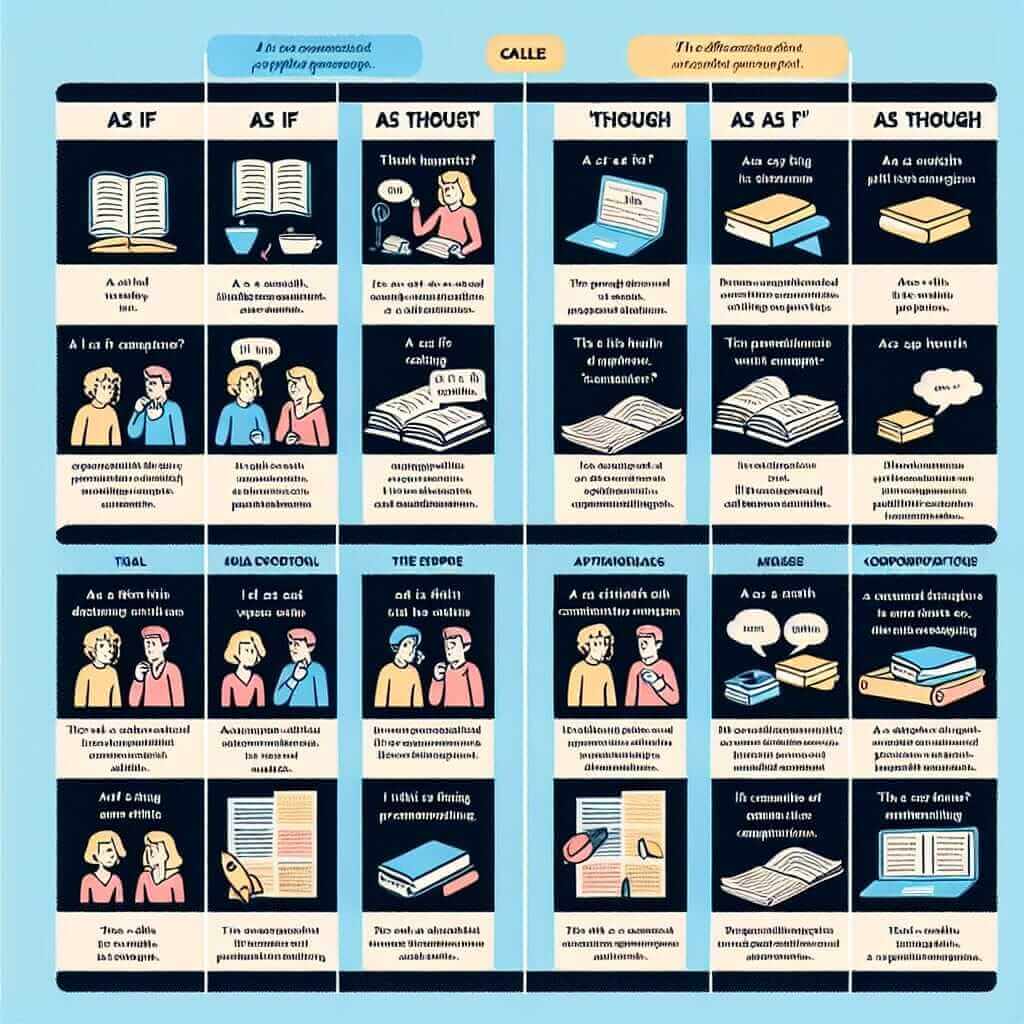“As if” and “as though” are two conjunctions that often trip up IELTS test-takers. While they appear simple on the surface, understanding their nuances and mastering their usage can significantly enhance your grammatical range and accuracy, contributing to a higher band score. These conjunctions frequently appear in both the listening and reading sections, and they can be skillfully incorporated into your speaking and writing responses.
Let’s consider these examples:
- Speaking: “I was so nervous during the interview that I felt as if I were going to faint.” (This sentence conveys the speaker’s extreme nervousness.)
- Writing Task 1: “The graph shows a sharp decline in sales, as though a major event had impacted consumer behavior.” (Here, “as though” effectively illustrates a dramatic trend in the data.)
Now, let’s delve deeper into the world of “as if” and “as though,” exploring their functionalities and how you can confidently wield them in your IELTS exam.
Unpacking ‘As If’ and ‘As Though’: Meaning and Usage
Both “as if” and “as though” function as conjunctions, connecting two clauses and expressing a comparison. However, this comparison is not based on reality but rather on an imagined or hypothetical situation. Essentially, they introduce a situation that seems to be true based on appearance or feeling, even if it might not be real.
Frequency in IELTS: While not overly common, understanding “as if” and “as though” is crucial for demonstrating a wider range of grammatical structures. These conjunctions are particularly useful in situations where you want to express hypothetical scenarios or unreal situations.
Mastering the Mechanics: Form and Structure
Using ‘As If’ and ‘As Though’
The good news is that both “as if” and “as though” are structurally identical. You can use them interchangeably with no change in meaning. The choice often boils down to personal preference or what sounds more natural in a particular context.
Here’s the basic structure:
Subject + Verb + as if/as though + Subject + Verb
Let’s illustrate this with examples:
- Present Tense: She acts as if she knows everything. (This implies that she might not actually know everything, but her behavior suggests otherwise.)
- Past Tense: He looked as though he had seen a ghost. (This sentence describes the man’s reaction, implying that he was very shocked or frightened.)
Expressing Unreal or Hypothetical Situations
The real magic of “as if” and “as though” lies in their ability to create vivid comparisons that highlight unreal or unlikely situations.
Consider these examples:
- Unreal Situation: “He spends money as if he were a millionaire.” (In reality, he is probably not a millionaire.)
- Hypothetical Situation: “As though reading my mind, she answered my question before I could ask.” (It’s highly unlikely she actually read the speaker’s mind.)
 As if vs. As though
As if vs. As though
Applying ‘As If’ and ‘As Though’ in IELTS
Writing Task 1: Describing Trends and Comparisons
- Example: “Despite the government’s efforts to control inflation, prices continue to rise as though no measures have been taken.” (This sentence emphasizes the apparent ineffectiveness of the government’s actions.)
Writing Task 2: Expressing Opinions and Arguments
- Example: “Some argue that social media has made us more disconnected, as if true human connection can be replaced by online interactions.” (This sentence presents a viewpoint critically assessing the impact of social media.)
Speaking Part 2 & 3: Adding Detail and Speculation
- Example: “The city center was bustling with activity, as though everyone had come out to enjoy the beautiful weather.” (This sentence paints a lively picture of the city center.)
Scoring Higher: Advanced Usage and Alternatives
To impress the examiner and aim for a Band 7 or higher, consider these tips:
- Variety of Structures: Use a mix of simple and complex sentences, incorporating “as if” and “as though” naturally within your writing and speaking.
- Formal Tone: In formal writing, like IELTS essays, “as though” might be considered slightly more formal than “as if,” although both are acceptable.
- Synonyms and Alternatives: Explore synonyms like “like” or phrases like “it seems as if” to demonstrate vocabulary range. However, remember that these options might not always be perfect substitutes and could alter the nuance of your sentence.
Common Errors and How to Avoid Them
- Incorrect Tense Harmony: Ensure the verb tenses in both clauses align logically.
- Incorrect: He talks as if he knows everything. (Present tense with past tense)
- Correct: He talks as if he knew everything. (Present tense with past tense in the “as if” clause to indicate an unreal situation)
- Overuse: Using “as if” or “as though” excessively can make your writing repetitive. Strive for a balance of different grammatical structures.
Conclusion
Mastering “as if” and “as though” empowers you to craft more nuanced and expressive sentences, enriching your IELTS writing and speaking. Remember to practice implementing these conjunctions in various contexts, focusing on tense harmony and avoiding overuse. By confidently incorporating this grammatical tool into your repertoire, you’ll be well on your way to achieving your desired IELTS score.


